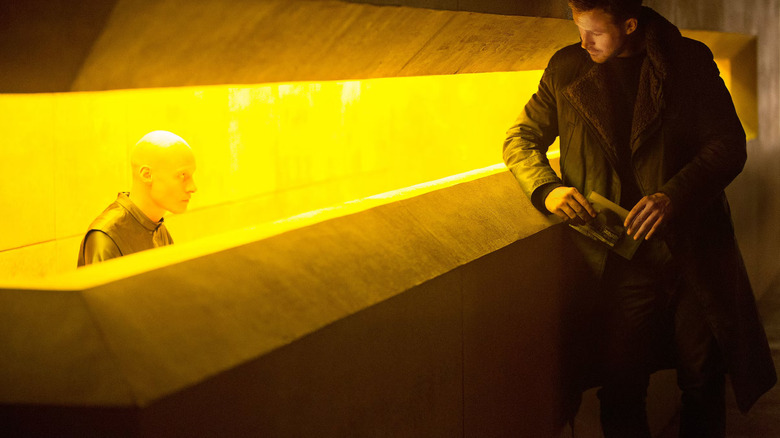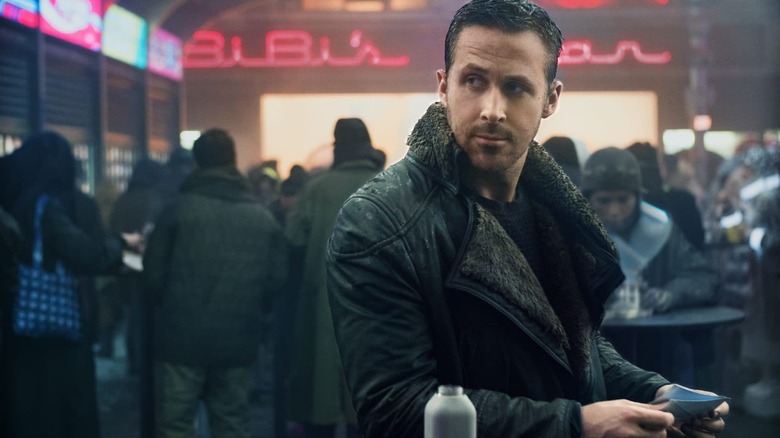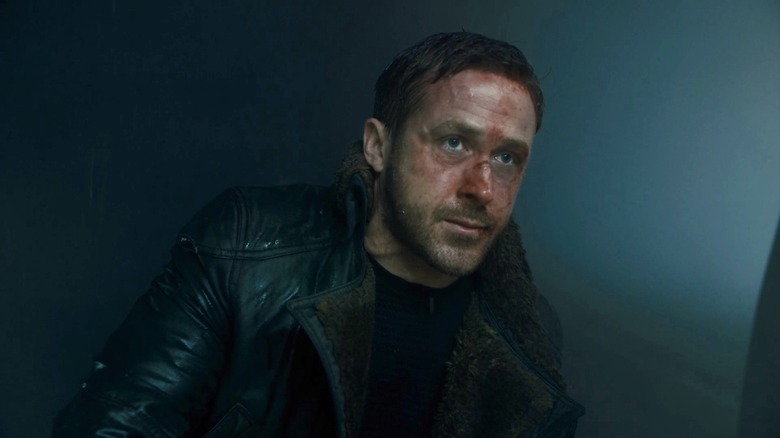Blade Runner 2049 Taught Dune Director Denis Villeneuve A Valuable Lesson
Denis Villeneuve's 2017 sci-fi film "Blade Runner 2049" is a worthy follow-up to Ridley Scott's 1982 flick "Blade Runner." Both presented unique and beautifully photographed sci-fi landscapes that were unique to the genre, and gorgeous to behold. They were the kinds of sci-fi landscapes that college-aged cineastes love to use as their laptop wallpapers. Additionally, both "Blade Runners" contained a few notably punchy action setpieces nestled in between steamroller-paced scenes of sorrowful contemplation. Also, both were infused with the same flavor of navel-gazing angst that feels incredibly profound when you're 16. Villeneuve's film outstripped Scott's in that it was a full 46 minutes longer.
"Blade Runner 2049" was Villenueve's ninth feature film as a director, having established his aesthetic in Canada with films like "Polytechnique" and "Incendies," and who became an international superstar with the success of films like "Prisoners" and "Sicario." Villeneuve's films tend to feature a very particular type of hazy, dreamy photography, a terse interior style, and a calming pace that often stands in contrast to his frequent scenes of violence or pressure. The director has many fans, and his latest film, "Dune: Part Two" is — as of this writing — poised to be the year's biggest blockbuster so far.
Villenueve's artistry is unique and striking, but how would it compare to the master stylist Ridley Scott? As it happens, Villeneuve thought about this question a lot. In a new interview with the Hollywood Reporter, the French Canadian filmmaker was asked about "Blade Runner 2049," and he expressed consternation about making a sequel to a film as widely beloved as "Blade Runner." Villeneuve claimed that it taught him to never dabble with another filmmaker's world ever again.
High anxiety
It seems that Villeneuve is a huge fan of Scott's movie. So much so that drove himself a little crazy trying to be as respectful as possible. After all, few films have been rewatched, combed over, analyzed, and carefully re-edited as much as "Blade Runner." Indeed, it took until 2005 for Scott to finally perfect the movie with "Blade Runner: The Final Cut." Scott needed 23 years to futz with his picture. Villeneuve had to get it right on the first try. The director said:
"'Blade Runner' is one of my favorite films, and it's absolutely a masterpiece. Ridley Scott is one of my favorite filmmakers, and even though he had given his blessing, it was very important for me to hear it and see it in his eyes that he was okay with me doing the movie at the time. But I was constantly thinking about the original film as I was making 'Blade Runner 2049.' It was impossible not to. So '2049' was really a love letter to the first film, but it was by far one of the most difficult projects I've ever done, and I don't think I will ever approach someone else's universe again."
Villeneuve even admitted to losing sleep on the matter, continuing:
"I still wake up sometimes at night, saying, 'Why did I do that?' I'd declined a few other projects of that scale, but at the time, I said to myself, 'It's a crazy project, but it's worth the risk of losing everything.'"
He doesn't elucidate on which details he feels he got wrong, or in what ways he disrespected "Blade Runner." To this author's eye, the two films are similar enough in tone and themes that they are pretty much equally entertaining.
The other times Denis Villeneuve played in other sandboxes
Villeneuve, of course, went straight from "Blade Runner 2049" to another adaptation of Frank Herbert's "Dune," so it seems the lesson didn't stick. "Dune" was famously adapted to film in 1984 by David Lynch in a version that we weirdos tend to like (even if Lynch himself isn't fond of it), as well as a pair of TV miniseries in 2000 and 2003. Villenueve's two "Dune" movies are examples of him playing around in Frank Herbert's sandbox (in this case, literally), and perhaps even in Lynch's.
Indeed, Villeneuve admitted some anxiety when making "Dune" as well, as it was another notable sci-fi classic he was fond of growing up. He said he asked his composer, Hans Zimmer "Is it a good idea to try to bring our childhood dreams to the screen? Are we meant to fail?" He didn't want to play with the art of others, but as it so happens, it looks like he can't stop.
Villeneuve's "Incendies" was adapted from a play by Wajdi Mouawad, and his "Enemy" was taken from the novel "The Double" by José Saramago. "Arrival," Villenueve's sci-fi film about a linguist trying to translate an alien language, was an adaptation of Ted Chiang's 1998 novella "Story of Your Life." As it so happens, six of Villeneuve's nine films qualify as the man playing around in another artist's sandbox. In the man's defense, however, Mouawad's play, Saramago's novel, and Chiang's novella don't quite carry the same widespread pop cultural clout as Ridley Scott's "Blade Runner," nor the cult appeal of Frank Herbert's "Dune." Perhaps it was the film's and the novel's respective high profiles that inspired Villeneuve's consternation.


